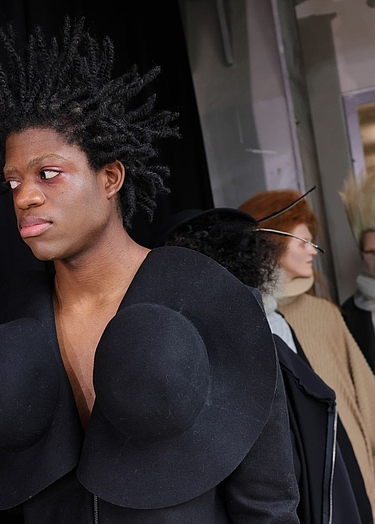
News

The Corona pandemic and the related sanctions of the government are hitting the textile and fashion industry hard. Globally, the industry has experienced a huge drop in sales.
According to a nationwide member survey conducted by the Textile and Fashion Association, about 80 percent of the medium-sized companies surveyed said they had applied for short-time working allowances and 22 percent said they had to file for bankruptcy within one month at the latest under the current conditions.
Although shops with a retail space of less than 800 square meters and strict hygiene regulations are allowed to reopen on Wednesday in Berlin, the store closures as well as interrupted supply chains, difficult working conditions and great uncertainty of the last weeks clearly show their signs. But also another result of the survey shows that it is not an option to bury your head in the sand in the face of the crisis. A total of 40 percent of the textile and fashion manufacturers surveyed said they had switched their production to making mouth and nose masks.
Stores switch to e-commerce
We listened to Berlin stores, labels and designers and wanted to know how they were dealing with the crisis situation.
Nicole Jäckle, the managing director of the sustainable supermarché store, is among those who are worried their business might not survive the crisis. The Berlin store had to close for almost 5 weeks. "This means that 90% of our revenue has disappeared from one stroke to the other, but we still have to deal with fixed costs such as rent, insurance, ancillary costs, contracts, etc. Meanwhile, our shop is full of new summer goods that we have already paid for but cannot sell. In July autumn goods arrive and with it further invoices. Our seven employees are short-time working, which is also very unpleasant for us, because we know that they get far too little money as a result," explains Jäckle.
Although the situation is improving according to the latest decisions of the government, Jäckle is aware that the situation will not be the same as it was before Corona: "The hustle and bustle in the shop on a Saturday will not happen for the first time and the associated revenues with it." As with many other Berlin stores, the store closures at Supermarché have led to the establishment of an online shop. Among other things, face masks are a new addition to the portfolio. The masks are sewed by the employees themselves. Jäckle is especially grateful to her regular customers, who show solidarity in the current difficult times and show sympathy in e-mails and purchase vouchers.
The founder of the design label Nix, Barbara Gebhardt, has also switched to mask production: "As a fashion statement, we have designed masks to match our collection and put them on the net. The feedback was enormous and we have only been sewing masks for two weeks, although we actually wanted to inspire people to sew them themselves."
Jewellery designers suffer from cancelled wedding celebrations
For the jewelry designer Johanna Gauder, who sells her jewelry mainly online, the crisis is more noticeable at another point: "In addition to the sale of the collection jewelry, I make marriage and engagement rings on request. Many weddings will be postponed or cancelled until next year, creating a significant long-term sales gap." Like many others, she is hoping for a rethinking of society in these days towards more sustainability, "[...] away from fast-fashion to conscious, sustainable consumption and the appreciation local producers."
Designers hope for more sustainability after the crisis
The designer duo Jale Richert and Michele Beil from Richert Beil was taken aback by Corona: "We didn't expect having to keep distance immediately after our UTOPIA show on March 6th. It was the last day of normality for us. Currently we are all working from home and some appointments and orders have unfortunately been canceled. Our entire team makes masks and we sell these and other items online better than in the previous seasons. " Richert Beil are currently using the opportunity to test new ways of communication and networking. They think that the crisis could also be an opportunity: "Due to the Corona crisis, the focus is now on regional brands, which is very positive. Berlin has been given a chance to use the crisis to become independent of other fashion weeks and reacting spontaneously. We'll see how everything is going to develop. What is important here is cohesion within the industry and the courage to let go of structures which are no longer effective. "
The Berlin-based designer Kilian Kerner reports that the situation is threatening his existence as well. Sales are collapsing while the running costs remain. Hardly anyone copes with that so easily. The designer decided to go on the offensive and also started to make masks and distribute them through his online shop. The special feature: Five euros of the sales price of 14.95 euros will be donated to the Berliner Tafel.
The designer Isabel Vollrath felt paralyzed at first by the situation and the associated uncertainty. The pandemic hits them at a time when it begins to deal with socially and consumer-critical issues and suddenly changes everything. She interprets it as a "revenge of nature," as she explained in an interview with 4SEE magazine.
Leyla Piedayesh, founder of the lala Berlin label, is also hoping for a social rethinking, away from fast fashion, towards greater value, as she explained to the Berliner Morgenpost. Their employees are also in home office and their fokus has moved to the online shop.